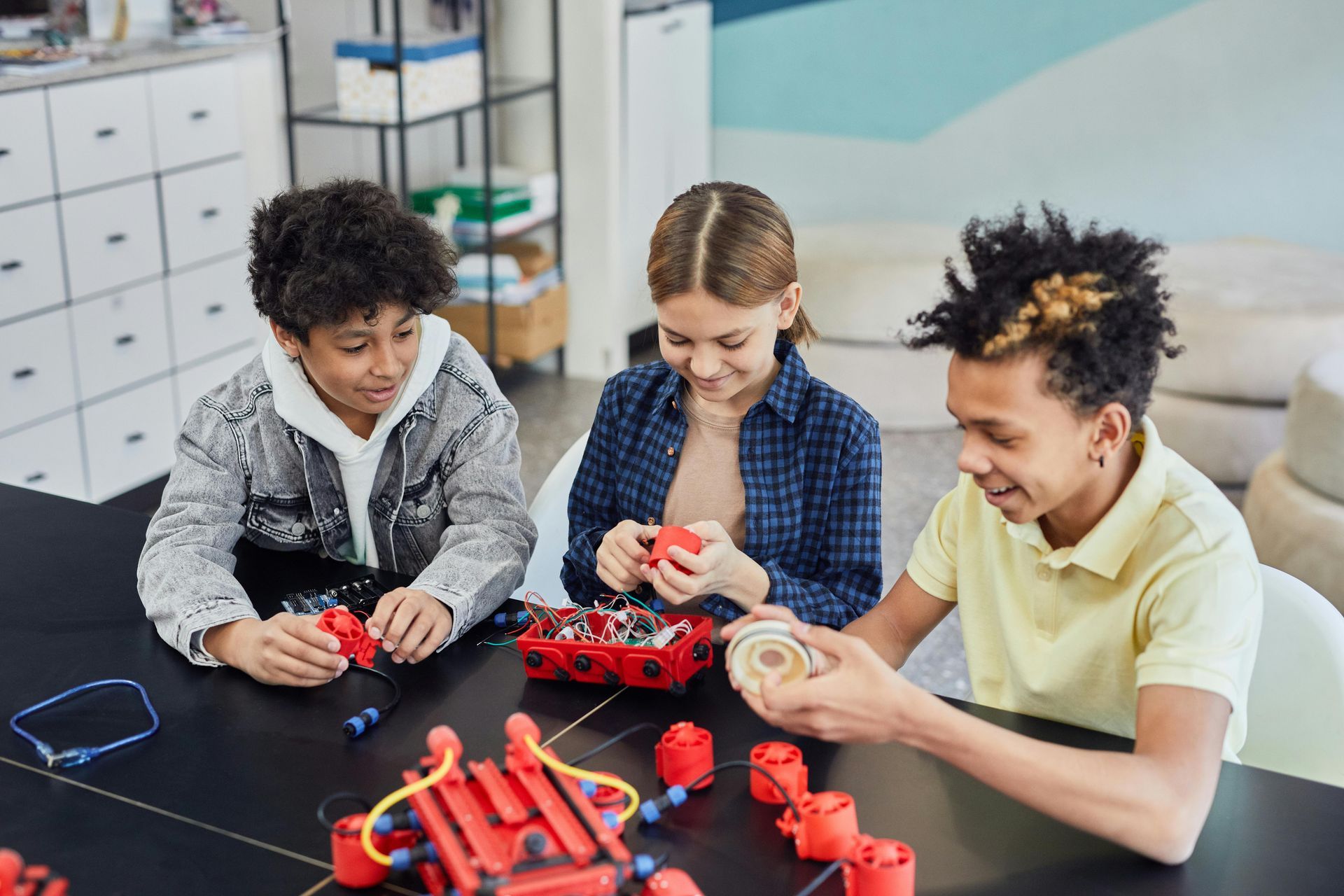Incorporating STEM in Early Childhood Education at Mt. Sinai CDC

The Growing Importance of STEM Education
In today’s fast-paced, technology-driven world, STEM education—science, technology, engineering, and mathematics—has become a vital part of a child’s educational journey. These fields are not only fundamental to understanding the world around us but are also at the heart of many innovations and career opportunities. As the global economy continues to evolve, STEM skills are increasingly recognized as essential for future success.
At Mt. Sinai Children’s Development Center (CDC), we understand that the earlier children are introduced to STEM concepts, the better prepared they will be for the challenges and opportunities of tomorrow. We have adopted a hands-on, inquiry-based approach to STEM education that encourages curiosity, problem-solving, and critical thinking from a young age. Our goal is to create a strong foundation in STEM that will serve as a springboard for future academic achievements and personal growth.
Why STEM Education Matters in Early Childhood
While STEM fields may seem complex, introducing children to these concepts at an early age can be both fun and engaging. Early childhood is a time when young learners are especially receptive to new ideas and experiences. Their natural curiosity and desire to explore make it the perfect time to introduce them to basic STEM concepts through play, exploration, and discovery.
Research shows that early exposure to STEM not only builds foundational knowledge in these subjects but also develops key cognitive and social-emotional skills, such as problem-solving, collaboration, and perseverance. For example, when a child engages in a science experiment or works with building materials, they are not just learning about physics or biology; they are also practicing skills like critical thinking, communication, and teamwork. These are skills that will benefit them throughout their academic journey and into adulthood.
How Mt. Sinai CDC Incorporates STEM
At Mt. Sinai CDC, we approach STEM education as an integrated, hands-on experience that encourages children to ask questions, explore, experiment, and learn through active participation. We believe that STEM should be relevant, engaging, and enjoyable for young children. Here’s how we incorporate STEM into our daily curriculum:
- Exploring Science through Discovery and Exploration
Science is all around us, and we help children discover it through hands-on activities and real-world experiences. Whether it’s observing the life cycle of a plant, experimenting with different materials to see which ones float or sink, or exploring the weather patterns, our science activities are designed to spark curiosity and wonder.
For example, our preschoolers often participate in simple experiments that allow them to make predictions and test their ideas. One of their favorites is the “sink or float” activity, where they drop various objects into water to see which sink and which float. This activity not only teaches basic scientific principles but also encourages critical thinking and inquiry. - Technology: Building Digital Literacy from a Young Age
While traditional forms of learning are essential, we also recognize the importance of introducing technology in an age-appropriate way. At Mt. Sinai, we incorporate technology to support learning and enhance educational experiences. Our classrooms are equipped with interactive whiteboards and tablets that allow children to engage in educational games, digital storytelling, and interactive lessons.
Technology also plays a role in teaching children about the world around them. For instance, children can use tablets to observe the changing seasons, explore virtual field trips, or access age-appropriate apps that promote early literacy and numeracy skills. By introducing technology early, we help children become familiar with digital tools and foster an understanding of how technology can be used for learning and exploration. - Engineering through Building and Problem-Solving
Engineering is all about solving problems, and at Mt. Sinai CDC, we encourage children to use their creativity and critical thinking skills to tackle challenges. Our classrooms are stocked with building materials like blocks, Legos, and other construction toys that inspire children to create, build, and innovate.
Through activities like building bridges, towers, or even simple machines, children learn about concepts such as balance, structure, and force. These activities not only foster an understanding of basic engineering principles but also encourage teamwork, as children often collaborate to complete their projects. - Mathematics: Learning Through Play and Exploration
Mathematics is another key component of our STEM approach. We introduce mathematical concepts through engaging, hands-on activities that involve counting, sorting, measuring, and pattern recognition. These activities are designed to help children develop a strong number sense and an understanding of mathematical concepts in a meaningful, real-world context.
For example, our preschoolers often engage in activities like sorting objects by size, color, or shape. We also use interactive games and puzzles that involve counting, addition, and subtraction. Whether they are measuring ingredients for a recipe, counting the number of steps to the playground, or organizing their toys, children are constantly exposed to math concepts in everyday situations. - Inquiry-Based Learning: Encouraging Questions and Exploration
At Mt. Sinai CDC, we believe that the best way for children to learn about STEM subjects is by asking questions and exploring the world around them. That’s why we encourage an inquiry-based approach, where children’s natural curiosity drives their learning. Instead of simply providing answers, we help children think critically and find their own solutions.
For instance, if a child wonders why the sky is blue, our teachers might provide them with materials to explore the concept further, such as books, experiments, or even a visit to the science center. This approach not only fosters a love of learning but also helps children develop problem-solving skills that are essential in STEM fields.
STEM and Social-Emotional Development
In addition to cognitive growth, STEM education also supports social-emotional development. Working on group projects, whether it’s a science experiment or a building challenge, helps children learn how to collaborate, communicate, and resolve conflicts. They learn how to take turns, share resources, and listen to others’ ideas—all of which are important skills in both academic and social contexts.
STEM also encourages resilience. Children often encounter challenges when trying to solve problems or complete projects, and learning how to overcome setbacks is an essential part of their development. By promoting a growth mindset and encouraging perseverance, we help children learn that failure is not the end but an opportunity to try again and learn from their mistakes.
Benefits of STEM Education at Mt. Sinai CDC
The benefits of early STEM education at Mt. Sinai CDC are far-reaching. Some of the key advantages include:
- Developing Critical Thinking and Problem-Solving Skills
STEM activities encourage children to think critically, ask questions, and develop solutions. These skills are essential for academic success and are transferable to all areas of life. - Fostering a Love of Learning
By making STEM concepts fun and engaging, we help children develop a passion for learning that will last a lifetime. Early exposure to STEM encourages children to see learning as an exciting adventure, not a chore. - Preparing for Future Careers
While it may seem far off, the skills children develop through STEM education are foundational for future careers in technology, engineering, and science fields. By fostering an interest in these areas early on, we help set the stage for future academic success and career opportunities.
At Mt. Sinai Child Development Center, we understand
how the first five years are critical to a child's development, which is why we focus on
fostering creativity and innovation in early childhood education to set the foundation for lifelong success.
Building a Strong STEM Foundation at Mt. Sinai CDC
At Mt. Sinai Children’s Development Center, we are committed to providing high-quality early education that incorporates STEM principles into every aspect of learning. By engaging children in hands-on, inquiry-based activities, we help them develop the critical thinking, problem-solving, and collaboration skills they need to succeed in school and beyond.
We believe that every child, regardless of background or ability, deserves the opportunity to explore STEM concepts in a supportive, engaging environment. As we continue to nurture the next generation of learners, we remain dedicated to creating an educational experience that fosters curiosity, creativity, and a lifelong love of learning.















